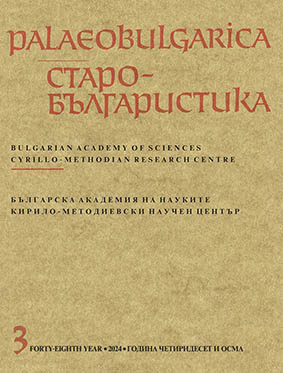Коя форма на родителното окончание -аего/-ааго/-аго са използвали старобългарските химнографи?
Which Form of the Genitive Termination -aego/-aago/-ago Did the Old Bulgarian Hymnographers Use?
Author(s): Regina KoychevaSubject(s): Language studies, Language and Literature Studies
Published by: Кирило-Методиевски научен център при Българска академия на науките
Keywords: genitive ending; contraction; Old Bulgarian hymnography; number of syllables.
Summary/Abstract: When publishing Old Bulgarian chants, hymnologists almost always reconstruct the genitive inflection for the masculine and neuter singular of the full-form adjectives, ordinal numerals and participles in its most archaic form: -aego (or -аjego). However, the early acrostics contain only the contracted variant -ago. This contradiction is resolved in the present article by examining the syllabic structure of various original (not translated) Old Bulgarian chants, among which the four canons with 12-syllable verse have the greatest evidential value. The analyses show that the disciples of Sts. Cyril and Methodius used both uncontracted and contracted forms of the genitive ending. Taking this characteristic linguistic feature into account will lead to more accurate results of the versification studies on the most ancient Slavic hymnographic works
Journal: PALAEOBULGARICA / СТАРОБЪЛГАРИСТИКА
- Issue Year: 2024
- Issue No: 3
- Page Range: 137-156
- Page Count: 20
- Language: Bulgarian
- Content File-PDF

